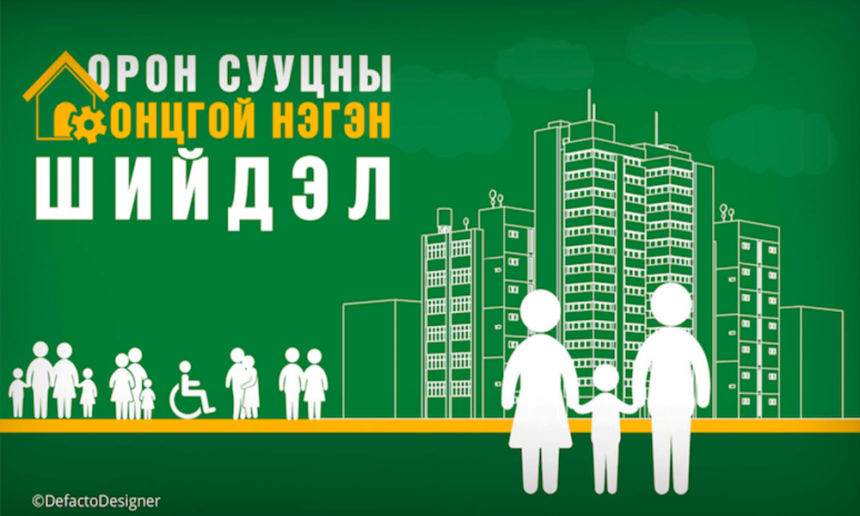Half of the 3.2 million of the Mongolian population is living in Ulaanbaatar, and half of the capital’s population is living in ger districts. With the 19th largest country in the world in terms of size, the roads of the capital no longer accommodate the people and cars, and the city is drowning in serious issues such as air pollution, soil pollution and other environmental problems.
We have been saying for a long time that the key to solving this problem lies in the zoning, planning, and housing, but with meager results. Despite the slight reduction in air pollution this winter due to the use of briquettes, problems of soil degradation and clean water shortage are still not solved. The best solution in the long-runs to provide housing to the ger districts, however, despite the many projects being implemented, ger districts are still expanding.
Although 250 thousand of the 840 thousand residents that are living in the ger districts applied for a housing loan, 15% of them did not meet the requirements. From a supply perspective, as of January 2020, 20 thousand apartment units have not been sold and are left vacant in Ulaanbaatar.
Fig. 1 Number of new apartments in Ulaanbaatar
Despite increasing the housing supply (Fig. 1), a citizen’s purchasing power remains low. On the other hand, it is noteworthy that as the housing supply increases, prices do not decline (Fig. 2).
Fig. 2 Average price per 1 square meter of new apartments in Ulaanbaatar (MNT 1,350,000)
The family the capability to buy a house or apartment is calculated based on whether 30% of the monthly income can be spent on housing. It turns out that 45% of the population do not have purchasing power (Fig.3).
Fig. 3 Mongolia’s family income groups, by month
Source: National Statistics Commission, 2019
However, the reasons for why housing prices are not falling are the high interest rates, the tugriks devaluation, and the fact that banks have acquired more houses, the increased cost of construction, and land licensing related corruption and other factors.
Singapore resolution
As a result of smart policies, implemented over sixty years, Singapore has already solved its housing problem. Today, 80% of Singaporeans live in communal apartments, and 90% of them already own apartments. The Housing and Development Board (HDB) has started constructing public residential developments sixty years ago. Their housing becomes 20-30% than from private sector. Households receive low-cost housing through various programs. For example, you can get a loan from your retirement fund through the personal account and get into housing without a pre-payment. Citizens accrue 20% of their salary each month and employers – 17% to the retirement fund. Whenever family moves to new apartment, they receive an allowance of up to $80,000 depending on their income, and for moving to an old apartment, they receive up to $120,000 as allowance. After a certain time, they can own the apartment. If unmarried, a person will not be able to own until the age of 35.
If the public residential development is privately owned, it cannot be sold for the first five years. High-income households cannot buy smaller apartments. Because they are not allowed to buy public apartments build by government funding, they have no other choice but to buy expensive apartments built by private entities.
Mongolia resolution
The Housing Corporation of the Capital City (HCCC) launched the Affordable Housing Program. The residents from areas in Bayankhoshuu and Shar Khad were resettled and seven other areas were acquired outside of the city including the Moringiin Davaa. This spring, infrastructure projects will be launched in these locations funded by HCCC, while business entities will be able to bid for housing construction tenders. The selection will be based on the assessment of the respective entities investment and the number of apartments, including the discounts and free housing, to be handed over to the HCCC. In turn, HCCC will rent out housing at a lower price and provide low-income residents with access to the rent-and-own option. In this way, ten thousand families will be provided with an affordable and ecologically friendly home. Of these, 1500 are rented, 3000-5000 are rent-and-own apartments and the rest will be sold by the developers themselves. According to the Executive Director of HCCC Sukhbaatar B., this project will be implemented within five years.
Three long-term goals were set for the Affordable Housing Program in Ulaanbaatar: to diversify the supply; to establish a sustainable financing mechanism; to create a legal environment and institution for the implementation. The strategy will ensure the full involvement of all relevant stakeholders, including government, private sector companies, tenants and local authorities. The necessary funding will be provided by international institutions with subsidized and highly subsidized long-term loans. For example, an $80 million loan from the Asian Development Bank and a $145 million loan from the Green Development Fund are already issued. The HCCC will immediately pay for all affordable accommodation, and developers with a performance of over 70% will be provided with loan guarantees.
Are the HCCC projects actually going to be implemented?
Since the city administration has put an end to fees and bribes by making all stages of the housing construction transparent, this HCCC project may actually solve Ulaanbaatar’s housing problems. However, this year of 2020 is an election year, and hence, the implementation may be problematic. Citizens have often seen how the elected government takes down endeavors of the previous one. Therefore, to separate these projects from politics, now we need the understanding and faith of all citizens. To do this, it is important that the project is open and relevant stakeholders are involved. Otherwise, another dream will just stay on paper and fade over time.
2020.02.19
Trans. by Riya.T and Sungerel.U







